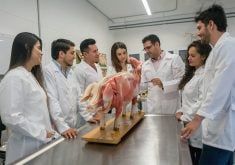The U.S. Department of Agriculture is lowering its cooking recommendations for pork.
The new guidelines say the internal temperature of pork must rise to 63 C, down from the 20 year standard of 71 C.
That’s good news for consumers and producers, said Mary Ann Binnie, the Canadian Pork Council’s manager of nutrition and food industry relations.
“We’re very pleased that the USDA has recognized that pork does not need to be cooked any differently than the other meats,” she said.
Read Also

Fuel rebate rule change will affect taxes and AgriStability
The federal government recently announced updates to the fuel rebates that farmers have been receiving since 2019-20.
“We’re waiting anxiously for Health Canada to endorse the same.”
Binnie said those few degrees can make a big difference in pork’s texture and taste.
“We have been long aware of the fact that cooking pork to the 71 C is just too high for the whole muscle cuts. We’re really sacrificing consumer’s pleasure in enjoying pork,” she said. “By overcooking pork, the consumer is not having the eating satisfaction that they could. It would be good news to let consumers know from a health and safety stand point we do not need to cook pork to the 71 C.”
She said the new guidelines are also good news for producers.
“It definitely would have advantages to the pork industry because the consumer would have a better eating experience and be more inclined to serve more pork.”
The USDA said it made the change after several years of research and discussions with producers and food safety experts.
Producers proposed the change in 2008, based in part on new production methods that reduced the risk of pathogens, such as improved feed and housing methods.
Binnie said the pork council is eager to help Health Canada officially adapt a lower temperature.
“If Health Canada wants some sampling done here in Canada or any verification to Canadianize the data, wedefinitelywill be wanting to do that.”
———
access=
subscriber section=farmliving, neownes, none















